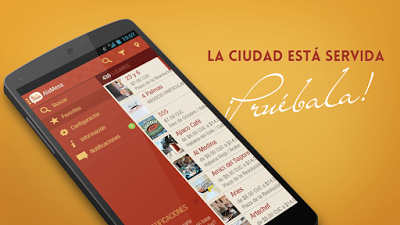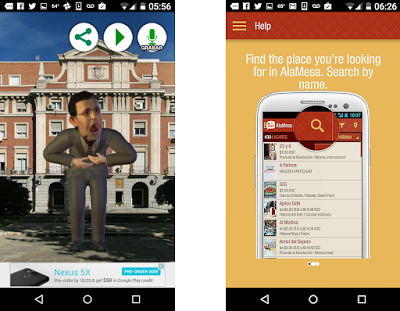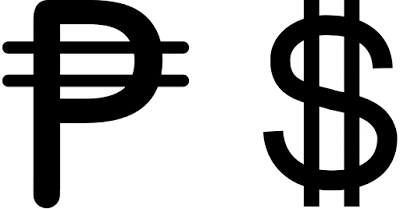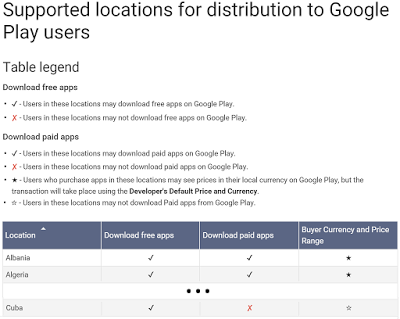Cuba USA
One way to get clarification is to offer some Cuban software for sale and see what happens -- in the U. S. and in Cuba.
Last September, the Office of Foreign Assets Control (OFAC) eased restrictions on trade with Cuba. Restrictions were reduced in many areas -- travel, commercial and financial transactions, support for and remittances to people in Cuba, etc., but the one that caught my eye was an easing of restrictions on telecommunications and Internet-based services, including this statement:
Could a Cuban programmer now offer apps for sale in places like the Apple, Google, Amazon and Microsoft app stores?
The new rule leaves several things unclear, so I asked the Treasury department for clarification, as follows:
During a recent, somewhat frustrating, trip to Cuba, U.S. Commerce Secretary Penny Pritzker stated that "There is much we in the United States do not fully understand about the Cuban economic system." While I would not want to suggest that U. S. regulations are as hard to understand as Cuba's, this one seems muddy.
One way to get clarification is to offer some Cuban software for sale and see what happens -- in both the U. S. and in Cuba.
-----
Update 10/17/2015
Reader Rodney Hernandez pointed out that there is at least one free Cuban app in the Google Play store, the AlaMesaCuba restaurant guide. The publisher says an iTunes version will be available soon. The FAQs on the Google Play site state that AlaMesaCuba "Has been created and developed by Cubans living in Cuba" and their domain name registrant has a Cuban address and phone number, so Cubans are working on the app.
But there is a US tie as well. The Web site says the app is "offered by" ISLA Management LLC and the "developer" address is that of Inca Investments, a Miami investment firm that specializes in Latin America.
One more thing -- I could not find the AlaMesaCuba app by searching on my Nexus phone, but I was able to install it from the Web site. When I first ran it, it downloaded the current database. I guess the database is maintained in Cuba and updated periodically.
I've never encountered an app that was listed online, but not on my phone before -- is that common? Does it have something to do with fuzzy regulations?

-----
Update 10/22/2015
I've got two Cuban apps on my phone now, AlaMesaCuba and KickRajoy. KickRajoy is written by a Cuban living out of the country and AlaMesaCuba is written by programmers living in Cuba, but distributed with the help of people in the US.
Both are free, but KickRajoy has ads at the bottom of the screen. I assume that the programmer gets a portion of that ad revenue. Does AlaMesaCuba generate revenue in fees for listings? Have their US partners paid the developers as an investment?
Are there other apps being sold in the US with payments going to Cuba? Note that Cubans are now allowed to write apps for companies and clients -- they do not have to be in Google's store or anyone Else's.

-----
Update 10/29/2015
There is a discussion of this post at Slashdot.
-----
Update 3/18/2016

Silicon Valley payments startup Stripe will make it possible to give Cuban entrepreneurs access to the US financial system. Cubans will be able to incorporate a US company, set up a US bank account, and start accepting payments from the US.
Stripe CEO Patrick Collison said the expansion into Cuba came together quickly after White House officials recently visited with aspiring Cuban entrepreneurs who requested such a service.
Well, I guess that puts the ball squarely in Cuba's court. Will they allow cuentapropistas or cooperatives to open those accounts?
When will we see a Cuban version of Stripe? Global Stripes?
-----
Update 3/19/2016
When I posted this note, officials I spoke with were not sure how to interpret the changes, but the administration is sending an unambiguous signal to US companies that payment to Cuba is authorized by inviting Stripe CEO Patrick Collison to join the White House delegation to Cuba. Stripe was valued at $5 billion before the trip -- I bet it will be a lot more after the trip.
-----
Update 3/11/2016
On March 15, 2016, the U.S. Department of the Treasury and the U.S. Department of Commerce issued new amendments to regulations governing travel, trade, and financial transactions with Cuba. They include the following changes:
- Internet-related Announcements Around President Obama's Trip To Cuba
There were important financial and university-related announcements. Last month, I speculated on possible Internet-related announcements that might be made in conjunction with the visit of President Obama. Nothing I mentioned came up, but let's look...
- Cuban Un Report Condemns The Embargo -- Their Telecommunication Claims Are Overstated..
The embargo is one obstacle faced by the Cuban Internet -- the claim overlooks the impact of the Cuban economy and the government's fear of information freedom On October 23th, the United Nations General Assembly is expected to vote on a resolution...
- If You Are Reading This, You Are Probably Not In Cuba.
I've been involved in a conversation about content blocking in Cuba recently. The discussion began with this screen shot -- a notice that my blog could not be found at a Nauta access room in Cuba: I asked around and found one private home where my...
- The Us Will Allow Imports From Cuba's Nascent Private Sector -- Will Cuba Allow Software Exports?
Will Cuban programmers be allowed to sell software and do offshore programming and localization in the US and online? Many people have asked me whether I expect the Cuban Internet to thrive after rapprochement with the US, and I tell them that is up to...
- Yoani Sánchez Lists The Ten Most Popular Android Apps In Cuba
Cubans can't use their smartphones as high-speed Internet access devices, but they are using them as small computers -- accessing local databases, running office-like apps, editing photos, etc. Yoani Sánchez has compliled a list ot the ten most...
Cuba USA
Trying to clarify the latest U. S. opening to Cuba -- and failing
One way to get clarification is to offer some Cuban software for sale and see what happens -- in the U. S. and in Cuba.
Last September, the Office of Foreign Assets Control (OFAC) eased restrictions on trade with Cuba. Restrictions were reduced in many areas -- travel, commercial and financial transactions, support for and remittances to people in Cuba, etc., but the one that caught my eye was an easing of restrictions on telecommunications and Internet-based services, including this statement:
Mobile applications. To further enhance the free flow of information to, from, and among the Cuban people, OFAC is adding a provision in section 515.578 to authorize the importation into the United States of Cuban-origin mobile applications. In addition, OFAC is authorizing the employment of Cuban nationals by persons subject to U.S. jurisdiction to develop such mobile applications.It sounds like the US government will now allow Cuban programmers to sell mobile apps in the US. (Recall that computer programmer is one of the jobs authorized for self employment by the Cuban government).
Could a Cuban programmer now offer apps for sale in places like the Apple, Google, Amazon and Microsoft app stores?
The new rule leaves several things unclear, so I asked the Treasury department for clarification, as follows:
- Why is the regulation limited to "mobile" apps and how do they define "mobile" app since Microsoft (Windows 10) and Google (Android) are moving to software that can run on a phone, tablet, laptop or desktop PC -- it seems that mobility is a property of the device running the app, not the app itself.
- Can the application be developed for a U. S. business, as opposed to an individual?
- Does the Cuban programmer have to be a self-employed individual (a "cuentapropista") or could the app be developed by a Cooperative or a government enterprise?
- The application can be developed for a U. S. business.
- OFAC does not have a definition of "mobile" and, if an individual has a specific question as to whether certain software qualifies for the general license, they can contact OFAC.
- They have no comment on the reason for limiting the ruling to mobile apps.
- They have no comment on the question of dealing with cooperatives or Cuban government enterprises.
 |
| Cubans are allowed to offer free apps in the Google Play Store, but not paid apps. |
During a recent, somewhat frustrating, trip to Cuba, U.S. Commerce Secretary Penny Pritzker stated that "There is much we in the United States do not fully understand about the Cuban economic system." While I would not want to suggest that U. S. regulations are as hard to understand as Cuba's, this one seems muddy.
One way to get clarification is to offer some Cuban software for sale and see what happens -- in both the U. S. and in Cuba.
-----
Update 10/17/2015
Reader Rodney Hernandez pointed out that there is at least one free Cuban app in the Google Play store, the AlaMesaCuba restaurant guide. The publisher says an iTunes version will be available soon. The FAQs on the Google Play site state that AlaMesaCuba "Has been created and developed by Cubans living in Cuba" and their domain name registrant has a Cuban address and phone number, so Cubans are working on the app.
But there is a US tie as well. The Web site says the app is "offered by" ISLA Management LLC and the "developer" address is that of Inca Investments, a Miami investment firm that specializes in Latin America.
One more thing -- I could not find the AlaMesaCuba app by searching on my Nexus phone, but I was able to install it from the Web site. When I first ran it, it downloaded the current database. I guess the database is maintained in Cuba and updated periodically.
I've never encountered an app that was listed online, but not on my phone before -- is that common? Does it have something to do with fuzzy regulations?

-----
Update 10/22/2015
I've got two Cuban apps on my phone now, AlaMesaCuba and KickRajoy. KickRajoy is written by a Cuban living out of the country and AlaMesaCuba is written by programmers living in Cuba, but distributed with the help of people in the US.
Both are free, but KickRajoy has ads at the bottom of the screen. I assume that the programmer gets a portion of that ad revenue. Does AlaMesaCuba generate revenue in fees for listings? Have their US partners paid the developers as an investment?
Are there other apps being sold in the US with payments going to Cuba? Note that Cubans are now allowed to write apps for companies and clients -- they do not have to be in Google's store or anyone Else's.

-----
Update 10/29/2015
There is a discussion of this post at Slashdot.
-----
Update 3/18/2016

Silicon Valley payments startup Stripe will make it possible to give Cuban entrepreneurs access to the US financial system. Cubans will be able to incorporate a US company, set up a US bank account, and start accepting payments from the US.
Stripe CEO Patrick Collison said the expansion into Cuba came together quickly after White House officials recently visited with aspiring Cuban entrepreneurs who requested such a service.
Well, I guess that puts the ball squarely in Cuba's court. Will they allow cuentapropistas or cooperatives to open those accounts?
When will we see a Cuban version of Stripe? Global Stripes?
-----
Update 3/19/2016
When I posted this note, officials I spoke with were not sure how to interpret the changes, but the administration is sending an unambiguous signal to US companies that payment to Cuba is authorized by inviting Stripe CEO Patrick Collison to join the White House delegation to Cuba. Stripe was valued at $5 billion before the trip -- I bet it will be a lot more after the trip.
-----
Update 3/11/2016
On March 15, 2016, the U.S. Department of the Treasury and the U.S. Department of Commerce issued new amendments to regulations governing travel, trade, and financial transactions with Cuba. They include the following changes:
- Cuban origin software is now authorized for importation into the United States.
- Non-immigrant Cuban nationals in the United States will be permitted to earn a salary or compensation consistent with their visa status. U.S. companies are now also authorized to sponsor or hire Cuban nationals to work or perform in the United States.
- Internet-related Announcements Around President Obama's Trip To Cuba
There were important financial and university-related announcements. Last month, I speculated on possible Internet-related announcements that might be made in conjunction with the visit of President Obama. Nothing I mentioned came up, but let's look...
- Cuban Un Report Condemns The Embargo -- Their Telecommunication Claims Are Overstated..
The embargo is one obstacle faced by the Cuban Internet -- the claim overlooks the impact of the Cuban economy and the government's fear of information freedom On October 23th, the United Nations General Assembly is expected to vote on a resolution...
- If You Are Reading This, You Are Probably Not In Cuba.
I've been involved in a conversation about content blocking in Cuba recently. The discussion began with this screen shot -- a notice that my blog could not be found at a Nauta access room in Cuba: I asked around and found one private home where my...
- The Us Will Allow Imports From Cuba's Nascent Private Sector -- Will Cuba Allow Software Exports?
Will Cuban programmers be allowed to sell software and do offshore programming and localization in the US and online? Many people have asked me whether I expect the Cuban Internet to thrive after rapprochement with the US, and I tell them that is up to...
- Yoani Sánchez Lists The Ten Most Popular Android Apps In Cuba
Cubans can't use their smartphones as high-speed Internet access devices, but they are using them as small computers -- accessing local databases, running office-like apps, editing photos, etc. Yoani Sánchez has compliled a list ot the ten most...
